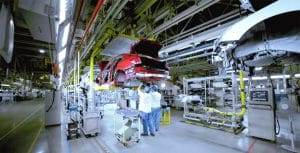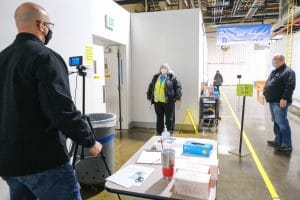
General Motors Executive Vice President Global Manufacturing Gerald Johnson said the company hasn’t had any new COVID-19 cases at its reopened plants.
General Motors has had no new COVID-19 cases occur at any of its global factories since beginning to ramp them back up in China more than a month ago.
The announcement comes as the Detroit automaker prepares to restart production operations in the U.S. next week. In a call with reporters, meanwhile, the head of GM’s North American manufacturing operations said they could be back up to normal operating levels within a month after reopening.
“We have had no transmission of the virus in our facilities. Not in China. Not in South Korea and not in North America,” said Gerald Johnson, GM’s director of global manufacturing said during a webinar sponsored by the Detroit Chamber of Commerce.
(General Motors bucks the trend and turns a small Q1 profit.)
Johnson credited the new health and safety protocols that the largest of the Detroit Big Three automakers has put into place since the outbreak of the coronavirus led to the shutdown of most of its operations around the world.

GM’s assembly plants in China haven’t reported any new COVID-19 cases since implementing new protocols, which will be used at U.S. plants.
Like rivals such as Ford and Toyota, GM has made numerous changes in the way it operates its assembly and parts plants to deal with the virus. Workers now must wear masks and other protective gear and are subject to checks such as having their temperatures taken to reveal whether someone might be carrying the diseases without showing other symptoms. Common areas, such as cafeterias and lavatories, have been restructured to emphasize social distancing, and additional changes have been made along the line to reduce the risk of infection.
The real test will come with the reopening of GM’s vast U.S. operations on May 18, with facilities in Canada and Mexico soon to follow.
“Not every facility will ramp up as fast as possible,” said Philip Kienle, head of North American manufacturing, during a media call on Monday. “Ideally, in a perfect world, by around June 15, all of our facilities would be operating at their original capacity.”
GM could use a quick restart. The automaker endured a 40-day shutdown in the U.S. last

General Motors’ employees at its Kokomo, Indiana plant have been working with new protocols in place for several weeks.
autumn when the United Auto Workers Union struck to get a more favorable contract. By the time the pandemic shutdowns hit in mid-March the company had yet to fully catch up on some of its most popular models, including the eighth-generation 2020 Chevrolet Corvette.
(GM’s April sales in China rebound, rising 13.6 percent.)
And even though U.S. new vehicle sales tumbled by nearly 40% in March and by almost half in April, demand remained strong in select product segments, notably full-size pickups like the Chevrolet Silverado and GMC Sierra, dealers now starting to see shortages of some of the more popular configurations.
On the other hand, there are plenty of sedans and some other products, so GM will adjust its ramp-up accordingly, Kienle signaled. “I just give the caveat market demand. We’re not going to override market demand.”
Whether GM actually can move as quickly as it wants over the coming weeks and months will depend upon a number of factors, some of them out of its control, however. These include the possibility of new cases of COVID-19 at U.S. plants, possible restrictions enacted by state and local governments and, most worrisome to many industry analysts, what will happen in the industry supply chain.
The vast majority of the parts that go into any automobile come from outside manufacturers, many of whom are struggling to survive due to the financial damage caused by the extended coronavirus shutdown. Even those with deep pockets are struggling to implement safety protocols that echo what GM and other automakers are putting into place.
It might only take complications at a single, key supplier to create a bottleneck leading to the shutdown of some of GM’s assembly plants – and those run by its competitors, said Joe Phillippi, head of AutoTrends Consulting. As a result, automakers have been reaching out to parts vendors to lend assistance as they prepare to resume operations.
(GM moving forward with preparations to restart plants.)
How it all comes together should become apparent over the next few weeks.


Why build more cars. No one is going to buy them. There is currently a surplus and the cheapest lease turn ins you have ever seen.
Enjoy the closure of the auto plants and screw the UAW.